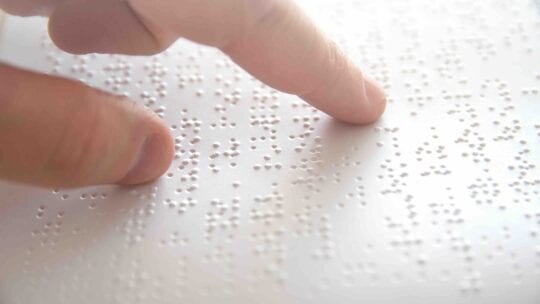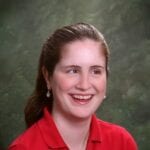

Senior PR Specialist Outlook Business Solutions
[Editor’s Note: October marked the 75th anniversary of National Disability Employment Awareness Month. To celebrate, we spoke with Rachel Carver, a senior PR specialist at Outlook Business Solutions, which is affiliated with National Industries for the Blind. The first blind person to receive PR accreditation (in 2017, renewed recently, during the pandemic), Carver discussed her decade in PR, what communicators without vision bring to the table, hiring people with disabilities and how the pandemic has changed her work and home life.]
PRNEWS: What do you do at Outlook Business Solutions?
Rachel Carver: I provide PR support and marketing and other needs to our sister entities and clients.
PRNEWS: What’s your typical day like?
Carver: I don’t have one. Some days I’m working on government affairs; other days I’m strategizing, writing sales messages, supporting advertising, working on social, writing releases or overseeing our freelance writers, who are spread across the country.
PRNEWS: So, it sounds like you are a typical PR pro?
Carver: Yes [laughter].
PRNEWS: Tell us about the company.
Carver: Outlook Business Solutions provides tailored business solutions to small businesses. We do this by hiring professionals with vision loss to complete the work. About half of our team members live with vision loss.
PRNEWS: What should PR leaders do if they are interested in hiring communicators with vision loss?
Carver: First, don’t assume you know what they can do. I suggest having an open discussion with the candidate about how they’ll do the job. Literally ask them, ‘How do you do these things?’ If you have a candidate with the skills you need, but who cannot see, chances are they will have solutions to get the job done.
When you hire a disabled person and collaborate with them to make sure they have the right tools, they will work hard and stay loyal to your company.
PRNEWS: Do you feel PR pros who are blind bring something to the table that others do not? In addition to what you said earlier, what are some incentives for PR leaders to hire employees who are blind?
Carver: Blind PR pros have similar skills to others in the field, but might look at things differently. For example, a person with vision loss can tell you if your email, ads and other messaging platforms are accessible with screen-reading software. They can offer insight into reaching potential customers with disabilities. And they can help you diversify your thinking and come up with ways to ensure people with disabilities are included in everything you do.
PRNEWS: That’s fascinating. Tell us more about accessibility testing.
Carver: We are launching and offering an accessibility test service. Say you are building a web site or mobile application; we have a team that can determine if it’s useable by the blind, deaf and other physically impaired people. There are a lot of issues involved, but the hardest thing for developers is that many of them have never met someone with a disability.
According to the CDC, there are 61 million people in the country with a disability. That’s a chunk of customers. If they can’t access your site, they’ll go elsewhere. There are some things, like getting a mortgage, that disabled people struggle with. But with other things, like restaurants, well, if I can’t access your menu, I’ll order somewhere else.
PRNEWS: Excellent. I imagine a lot of companies fail to account for disabled people during a crisis?
Carver: That’s a good point. A lot of COVID information is at the bottom of the TV screen and many visually challenged people are not going to see it. I have the technology and skills to access that information, but a lot of people don’t. When you run a TV ad and there’s a phone number on the screen, always announce the number. It doesn’t take much time. Also, make sure the images on your site have text around them.
PRNEWS: Has the pandemic changed how you do your job and what you do in your job?
Carver: Like many others, we use videoconferencing and work remotely when needed. Technology has allowed us to keep moving, even during the beginning of the pandemic. We shifted messaging and strategy to appropriately represent the times we are in.
Outlook Enrichment, a sister nonprofit entity to Outlook Business Solutions, began training clients virtually in March. They started virtual game nights and checked in on clients to ensure they had what they needed.
PRNEWS: Are you working from home or in an office?
Carver: Both. It’s nice to have that flexibility. I’m lucky because I used a small laptop and a screen reader, which reads what’s on my screen. I don’t have to worry about having a large screen or a shelf to hold a monitor, as some of my colleagues do.
PRNEWS: Has the pandemic had a particular impact on the disability community and employees who are disabled?
Carver: The report we’re linking to here indicates some of the challenges that have resulted from the pandemic. Grocery-delivery services became hard to depend on because so many others were utilizing them. Ordering rideshare for appointments meant longer wait times. Getting into a stranger’s car during a pandemic is a health risk that gives some anxiety. Distanced learning for blind children became challenging because different apps are not accessible to them. And since so many COVID-19 testing sites are drive-throughs, blind people who cannot drive had issues.
To support people with low vision, Outlook Enrichment created a COVID-19 helpline and kept an updated web page of resources. They also partnered with Shopping Angels to help at-risk visually impaired people in the community get essential items during the pandemic. There are stories everywhere of people and nonprofits stepping up to help the community during this time.
PRNEWS: Tell us what you did to mark National Disability Employment Awareness Month.
Carver: Each year, on social media, our company highlights stories of employees who are blind. We like to emphasize talentwithin the disabled community. Whether it is a freelancer or full-time employee, people with disabilities are just as capable as those without them. They just need to be given a chance to succeed.
Contact: [email protected]
